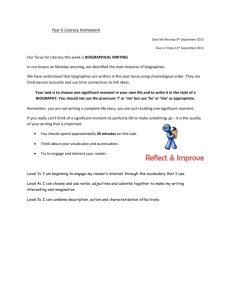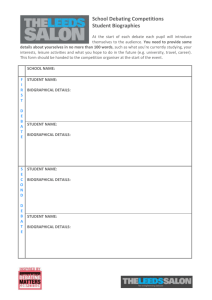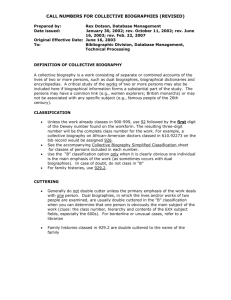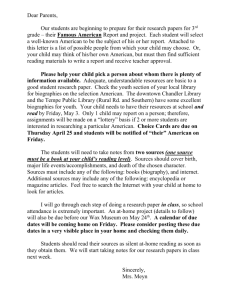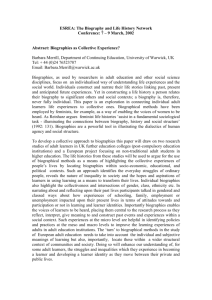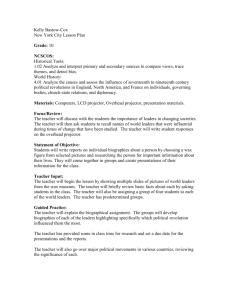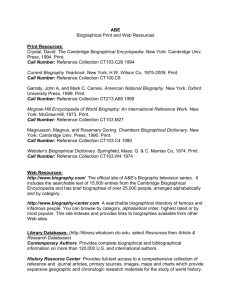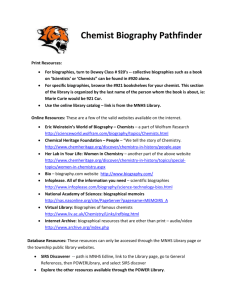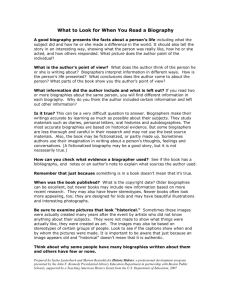RC 38: CALL FOR PAPERS
advertisement
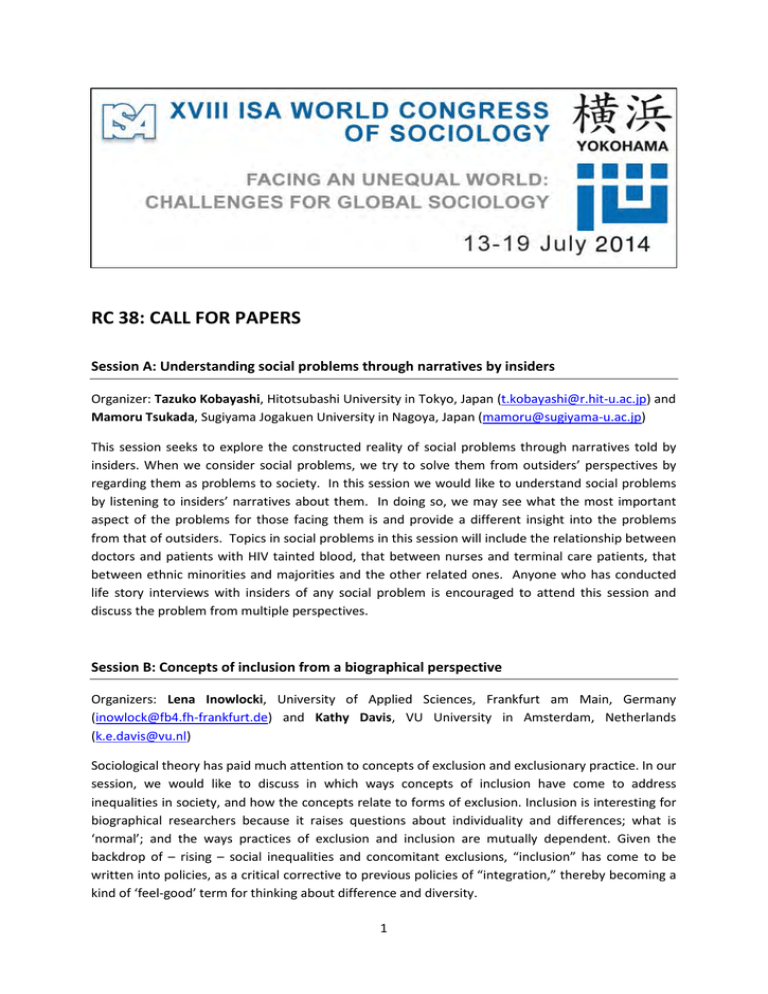
RC 38: CALL FOR PAPERS Session A: Understanding social problems through narratives by insiders Organizer: Tazuko Kobayashi, Hitotsubashi University in Tokyo, Japan (t.kobayashi@r.hit-u.ac.jp) and Mamoru Tsukada, Sugiyama Jogakuen University in Nagoya, Japan (mamoru@sugiyama-u.ac.jp) This session seeks to explore the constructed reality of social problems through narratives told by insiders. When we consider social problems, we try to solve them from outsiders’ perspectives by regarding them as problems to society. In this session we would like to understand social problems by listening to insiders’ narratives about them. In doing so, we may see what the most important aspect of the problems for those facing them is and provide a different insight into the problems from that of outsiders. Topics in social problems in this session will include the relationship between doctors and patients with HIV tainted blood, that between nurses and terminal care patients, that between ethnic minorities and majorities and the other related ones. Anyone who has conducted life story interviews with insiders of any social problem is encouraged to attend this session and discuss the problem from multiple perspectives. Session B: Concepts of inclusion from a biographical perspective Organizers: Lena Inowlocki, University of Applied Sciences, Frankfurt am Main, Germany (inowlock@fb4.fh-frankfurt.de) and Kathy Davis, VU University in Amsterdam, Netherlands (k.e.davis@vu.nl) Sociological theory has paid much attention to concepts of exclusion and exclusionary practice. In our session, we would like to discuss in which ways concepts of inclusion have come to address inequalities in society, and how the concepts relate to forms of exclusion. Inclusion is interesting for biographical researchers because it raises questions about individuality and differences; what is ‘normal’; and the ways practices of exclusion and inclusion are mutually dependent. Given the backdrop of – rising – social inequalities and concomitant exclusions, “inclusion” has come to be written into policies, as a critical corrective to previous policies of “integration,” thereby becoming a kind of ‘feel-good’ term for thinking about difference and diversity. 1 In this session, we want to critically explore “inclusion” from a biographical perspective, focusing on how individual strategies of inclusion (for example, ‘passing’) actually work, the social constraints that prevent inclusion of some, while enabling it for others (for example, inclusion as privilege of the powerful or as symbolic capital), as well as the policies and practices which change society and restructure institutions in the direction of less inequality and more recognition and acceptance of difference. Session C: The concept of transnationality under conditions of social inequality. A look at transnationality through the magnifying glass Organizers: Julia Bernstein, University of Cologne, Germany (jbernste@uni-koeln.de) and Agnieszka Satola, University of Frankfurt am Main, Germany (satola@em.uni-frankfurt.de) The goal of the session is to reflect on the concept of transnationality broadly used in the last two decades through close consideration of different studies about transnational biographies. The transnational biographies are aggregations of the ambivalence and complexity of the globalization. On the one hand, a transnational research perspective enables to scrutinize the micro-level of social action namely individual agency of knowledgeable actors, the people who move, as a meaningful reaction, and in contrast to the earlier macro-models of migration studies. Numerous recent studies have been dedicated to the analysis of new opportunities and changes in the social worlds and ways of life of transnational actors. On the other hand, the processes of globalization are inevitably connected with structures of inequality and social exclusion, which directly influence the individual biographies of transmigrants. Three questions appear to be especially relevant for this session: • How transmigrants cope with controversies of social inequality? • How the third transnational space created in the context of inequality can be analyzed on the basis of transnational biographies? • What new theoretically differentiated concepts can be suggested for analyzing significantly different ways of life which are hidden behind the general concept of transnationality? Session D: Biographies in the Global South and collective histories. Individual remembering in interrelation with public and hegemonic discourses. Organizers: Hee-Young Yi, Daegu University, Korea (biograf@hanmail.net) and Gabriele Rosenthal, Georg-August-University of Goettingen, Germany (g.rosenthal@gmx.de) We would like to invite colleagues who collected biographical data in countries of the Global South and who are analyzing the biographies in the context of the collective histories in these countries respectively regions, and the collectivities and groupings to which the biographers feel affiliated. The overarching question for this session would be, in which ways individual remembering is interrelated with collective memories and discourses. The practice of remembering is, depending on the historical and cultural context, subject to various social rules of commemoration and reveals traces of rules of remembering which were effective in 2 past or in different social and situational contexts. At the same time, it reveals the traces of the rules which are currently used. Session E: Biography and politics Organizers: Rosa Maria Brandhorst, Georg-August-University of Goettingen, Germany (RosaMaria.Brandhorst@gmx.de) and Michaela Koettig, University of Applied Sciences, Frankfurt am Main, Germany (Michaela.koettig@gmx.de) Individuals are actors in politics. Simultaneously, political framings and developments influence biographies to a great extent. This session addresses the mutual interrelations between biography and politics. We invite contributions from different theoretical and methodological perspectives approaching this topic, may they explore the way activists contribute to a political development at regional, national or global levels, or focus on the biographical meaning of political activism in past or contemporary political systems. Also papers are welcome which focus on political events and analyze how political actors and affected individuals revalue these events in retrospect, and which meanings they attach to them in their lives. Session F: Biography, violence and gender Organizers: Michaela Koettig, University of Applied Sciences, Frankfurt am Main, Germany (Michaela.koettig@gmx.de) and Hermílio Santos, Pontifícia Universidade Católica do Rio Grande do Sul (PUCRS), Porto Alegre, Brazil (hermilio@pucrs.br). The experience and the exercise of violence are highly connected to experiences of life history and specific gender roles. This session welcomes contributions that explore relations between violence, biography and gender at the theoretical and empirical level. The perspective of male and female perpetrators and victims at the level of couple and family relations and in the social context can be addressed. It may be asked, for instance, which historical and biographical developments and interactive mechanisms are connected with the exercise and experience of violence, how gender constructions are involved in these constellations and which individual, social and societal impact violent actions and experiences unfold. Session G: Different perspectives on life stories Organizers: Tazuko Kobayashi, Hitotsubashi University in Tokyo, Japan (t.kobayashi@r.hit-u.ac.jp) and Irini Siouti, University of Frankfurt am Main, Germany (Siouti@soz.uni-frankfurt.de) The session enables the presentation and discussion of methodological approaches and methods of analysis in biographical research. Participants from different theoretical and cultural backgrounds and with different methodological approaches are asked to exemplify their way of doing a biographical case study analysis using the same biographical-narrative interview provided ahead of time by the session organizers. In the session, the invited researchers will demonstrate their analysis of the case, their methodology and "technique" as a basis for comparison and discussion with each 3 other and the audience. The format of this session has become something of a tradition at the world congresses and enjoys great interest. Session H: Reconstructing gendered biographies in transcultural research settings: methodological challenges Session organizers: Bettina Dausien, University of Vienna, Austria (bettina.dausien@univie.ac.at), Irini Siouti, University of Frankfurt, Germany (siouti@soz.uni-frankfurt.de) and Hiromi Tanaka, Meiji University Tokyo, Japan (hiromi@meiji.ac.jp) In biography research gender is conceived not only as a social construction which is produced and reproduced in ongoing interaction processes but also as a biographically constructed and reconstructed social category. The thesis of the biographical construction of gender implies certain challenges for a reconstructive methodology in biography research: How can we “discover” gender constructions in biographical narratives without presupposing “typical” male/female attributes? The problem appears to be even more complex in transcultural research settings because gender constructions as well as patterns of biographical narratives and life courses are related to the respective societal and cultural context in which they are produced and communicated. In particular, the notion of the constructed character of gender and biographies makes it necessary to rethink and question common methodological premises of interpretative research and leads to a reflection of contemporary research and fieldwork practices. In this session we invite contributions focusing on the methodological challenges that the theoretical concept of gendered biographies implies in the field of transcultural biography research. Session I: Constructing biographies in different media Organizer: Roswitha Breckner, University of Vienna, Austria (roswitha.breckner@univie.ac.at), Gülsüm Depeli, Hacettepe University Ankara, Turkey (gdepeli@gmail.com), and Maria PohnWeidinger, University of Vienna, Austria (maria.pohn-weidinger@univie.ac.at) Biographical research has focused on written or oral narrated life stories since its beginning, and has developed a variety of very fruitful and well established approaches to elicit and to analyze them. The increasing use of so-called ‘new media’ in transnationalizing and globalizing social settings, crossing long distances and cultural diversity, calls for reflection how biographical imagination and creativity in general are shaped by different media and communication technologies. How is the construction of the self as a ‘creative work’ changing in multimodal processes? In how far are biographies constructed similarly and/or differently in narratives, photographs, pictures, film, video, artifacts, bodily performances, blogs, and social networks? How do the different modes of expression relate to each other? How can we get access to and understand these processes? This session invites speakers who deal with the characteristics of constructing biographies or biographically relevant experiences in different media, and welcomes reflection of these processes also from a methodological and methodical perspective. 4 Session J: Embodied biographies and sexy stories Organizer: Kathy Davis, VU University in Amsterdam, Netherlands (k.e.davis@vu.nl) This session focuses on sexual experiences, sexual practices and sexual identities from a biographical perspective. On the one hand, sexuality is often left out of biographical research as though it had no appreciable influence on people’s lives, sense of self, or relationship with the world around them. On the other hand, sexuality studies often look at sexual practices and cultural discourses without attending to how these practices and discourses shape individual biographies. In this session, we want to explore some of the methodological, normative, and theoretical challenges of biographical research on sexuality. For example, how do different social contexts and cultural discourses and normative formations shape people’s sexual experiences? How are sexual identities constructed in life stories? Session K: Biographical perspectives on intimacy and passion Organizers: Beate Littig, Institute for Advanced Studies Vienna, Austria (beate.littig@ihs.ac.at) Intimacy and passion look pretty different at first glance. However, they both involve intense emotional experiences which have meaningful repercussions on people's biographies. They are also experiences which can be difficult to talk about. This can be because they are so tied up with the body (something one feels but doesn't put into words) or because they are not public or because they are invisible or even secret. They may in some cases disrupt individual's ordinary lives, evoking shame, embarrassment, or even distress. The result is that they have been under-theorized and under-researched. We invite contributions which explore how experiences of passion and intimacy shape people's biographies, the kinds of narratives which can be told about these intensely desired, but often secret and sometimes disruptive experiences, and the methodological and ethical challenges which experiences of intimacy and passion present for biographical research. JOINT SESSIONS RC 05 and RC 38, hosted by RC 05: Intersectionality and intellectual biographies Organizers: Kathy Davis, VU University in Amsterdam, Netherlands (k.e.davis@vu.nl) (RC38) and Helma Lutz, University of Frankfurt am Main, Germany (lutz@soz.uni-frankfurt.de) (RC05) This joint session explores the ways social location shapes, limits, and enables the development of critical social theory. This will be done by means of intellectual biographies of theorists, social histories of schools of thought and their travels, and transnational ethnographies of theoretical and methodological perspectives challenging racism, sexism, ethnocentrism and nationalism. We invite contributions that focus specifically on the relationships between intersections of gender, class, race/ethnicity and national belonging and the development of critical sociological theory and practice. 5 RC 38 and RC 32, hosted by RC 38: Representation and Restoration of Women’s Experiences: Navigating between Colonial History and Postcolonial Present in the Asian Context Organizers: Hee-Young Yi, Daegu University, Korea (biograf@hanmail.net), Gabriele Rosenthal, Georg-August-University of Goettingen, Germany (g.rosenthal@gmx.de) (RC 38) and Bandana Purkayastha, University of Connecticut, USA (bandanapurkayastha@yahoo.com) (RC 32) This session aims to explore and restore the multilayered aspects of women’s experiences in postcolonial history in the Asian context. Based upon women’s biographies and oral life histories, this session will analyze how women negotiate the boundaries between state, nation, class, and gender, and examine how researchers can historicize them. Not only feminist theoretical approaches to hidden personal life histories, but also critical methods to hear, understand, and speak to the ‘historical other’ will be considered throughout the whole session. Since the 1990s when the testimonies of former comfort women drafted into the Japanese military forces during WWII garnered worldwide interests, there has been a great deal of research emerging in the field of women’s oral life history, especially in the East Asian countries. Since then, biographies of women, social minorities, or ordinary people have enabled many social scientists to rethink the meaning of History, Science, Reality, and/or Truth and have led to a growing interest in the unwritten, silenced experiences of people. Presenters in this session will pay attention to women who have experienced war, poverty, and gender violence; argue that women are not just powerless victims of history but active agents navigating the boundaries between structures and ideologies; and question our normative understanding of history, politics, and society. As such, this session will shed light on the theoretical and methodological implications of women’s oral life history with regard to the representation and restoration of women’s experiences in post-colonial Asia. RC 38 and RC 31, hosted by RC 38: Crossing experiences: from biographies of migrants in and from Northeast Asia Organizer: Sara Park, Kyoto University, Japan (bach_ps@hotmail.com) (RC 38), Lilach Lev-Ari, Oranim College, Israel (llevari@oranim.ac.il) (RC 31) This session intends to contribute to the progression of migration studies through biographies and family histories in and from the northeast Asian region (Japan, two Koreas and Chinas). Historically, northeast Asian countries have sent and accepted migrants over centuries. Because of drastic transitions in labor markets and demographic compositions, societies in this region now face a new period of migration, both in sending and accepting. On the other hand, histories of migrants in and from this region (i.e. Chinese, Korean and Japanese migrants in Americas, Koreans in Japan, wardisplaced Japanese in China, etc.) face difficulties in inheriting their past experiences. Biography and/or family history provide effective means of investigation of reasons and processes of migration. Such “personal” histories enable researchers to understand each phenomenon that deeply influences migration such as state policies, economic situations, and transnational networks, through a historical perspective in keeping with the reality of each migrant. 6 On these academic interests, this session particularly invites contributors who promote migration studies in the northeast Asian region from historical perspectives and empirical researches of migrant’s experiences, as well as locate their findings in the previous discussions in sociology that deals with international migration. 7
